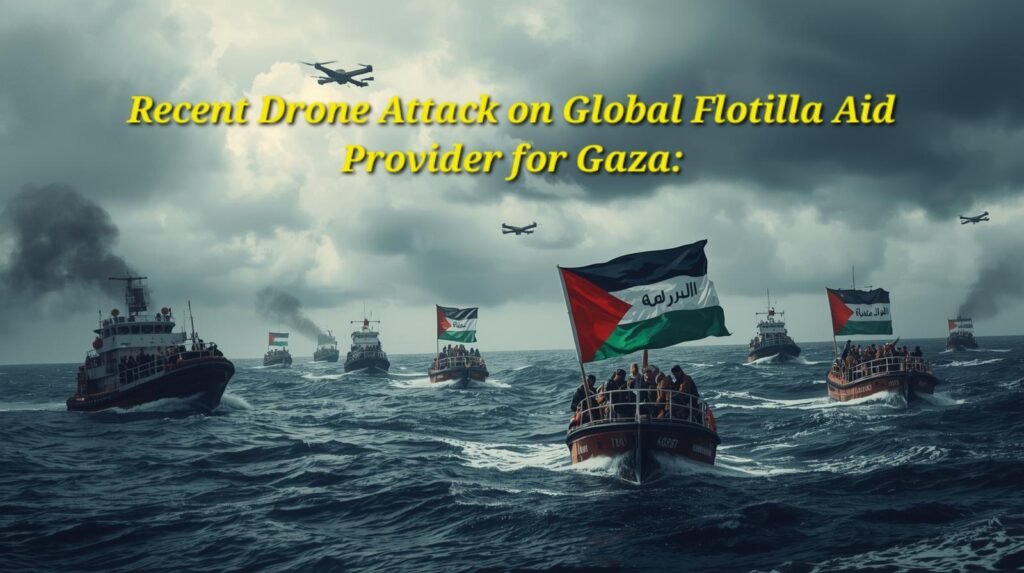
Table of Contents
ToggleRecent Drone Attack on Global Flotilla Aid Provider for Gaza: A Humanitarian Crisis at Sea
The recent drone attack on global flotilla aid provider for Gaza has shocked the international community, raising urgent questions about humanitarian rights, maritime security, and the obligations of states under international law. In recent months, aid flotillas attempting to deliver food, medicine, and essential supplies to Gaza have been targeted by drones in international waters, resulting in damage to vessels, psychological terror for activists and crew, and heated diplomatic fallout.
This blog will cover the timeline of events, international reactions, legal implications, and the broader humanitarian crisis tied to the recent drone attack on global flotilla aid provider for Gaza.
The Flotilla Movement and Gaza Blockade
For more than a decade, humanitarian activists and civil society groups have organized flotillas to challenge the blockade of Gaza. The blockade, enforced primarily by Israel, restricts the movement of goods and people, citing security concerns. Critics argue it deepens the humanitarian crisis, leaving Gaza's civilian population dependent on limited and controlled aid channels.
The flotilla movement aims to deliver relief directly to Gaza's shores while also drawing attention to the suffering of Palestinians. The recent drone attack on global flotilla aid provider for Gaza has made the journey even more dangerous and politically explosive.
Details of the Recent Drone Attacks
1. Drone Strikes off Malta (May 2025)
On 2 May 2025, the vessel Conscience, operated by the Freedom Flotilla Coalition (FFC), was attacked by drones in international waters near Malta. Two strikes hit the front of the ship, damaging the generator and causing a fire. The hull was breached, putting the vessel at risk of sinking. Fortunately, all 12 crew members and 4 civilians were rescued safely.
This incident marked the first major recent drone attack on global flotilla aid provider for Gaza in 2025 and set the tone for further hostilities.
2. Attacks near Greece (September 2025)
In late September, flotilla vessels sailing near Crete reported being harassed by more than 15 drones. Activists described explosions in the water, unidentified objects dropped from the sky, and communication jamming. Some boats sustained structural damage, including broken masts and disrupted navigation systems.
This escalation intensified global concerns. The recent drone attack on global flotilla aid provider for Gaza is now seen as part of a broader campaign to intimidate or deter humanitarian missions before they reach Gaza.
3. Psychological and Technical Warfare
Even when no direct strikes occurred, flotilla organizers reported persistent harassment: overflights, sonic booms, and jamming of satellite communications. Such tactics created fear and uncertainty for the volunteers, many of whom are civilians, clergy, or international human rights workers.
This form of "psychological warfare" is considered by many observers to be part of the recent drone attack on global flotilla aid provider for Gaza, broadening the definition of what constitutes aggression at sea.
International Reactions
The recent drone attack on global flotilla aid provider for Gaza sparked strong responses from several governments and international organizations:
Italy
dispatched a naval ship to assist the flotilla after drone harassment near Crete. Rome has called for aid to be delivered through recognized bodies but condemned violent interference in international waters.
Spain
expressed concern, suggesting humanitarian supplies should be delivered under international supervision, possibly via Cyprus or Church-led initiatives.
Turkey
with its history of involvement in flotilla incidents, condemned the attacks, drawing parallels to the deadly 2010 Mavi Marmara raid.
Israel
has reiterated that it will not allow unauthorized vessels to breach its naval blockade of Gaza, offering instead to process aid through ports like Ashkelon.
Meanwhile, human rights groups have urged the United Nations to investigate the recent drone attack on global flotilla aid provider for Gaza, citing possible violations of international maritime and humanitarian law.
Legal and Ethical Dimensions
The legality of the recent drone attack on global flotilla aid provider for Gaza hinges on several key issues:
1. International Waters
The flotillas were attacked in areas beyond territorial seas. Under maritime law, these waters should be free for navigation. Any hostile action there risks being classified as unlawful use of force.
2. Blockade Enforcement vs Humanitarian Law
Even if a blockade is legally declared, international humanitarian law requires that aid for civilians must be allowed through. Interfering with non-combatant humanitarian missions may breach these obligations.
3. Protection of Civilians
Humanitarian activists, clergy, and journalists aboard flotillas are considered civilians. Exposing them to drone fire or explosive attacks raises moral and legal red flags.
4. Accountability and Transparency
With flotilla organizers blaming Israel and Israel largely remaining silent, the lack of transparent investigations leaves room for accusations of war crimes. Independent verification is urgently needed.
Humanitarian Stakes
The recent drone attack on global flotilla aid provider for Gaza is not just a story about drones and ships. It is about people in Gaza facing shortages of medicine, clean water, electricity, and building supplies. According to UN agencies, over 2 million Palestinians in Gaza live under dire humanitarian conditions.
Every time an aid vessel is blocked, damaged, or turned away, the civilian population suffers further. For activists and civil society groups, continuing these flotillas is not only about aid but also about raising international awareness of Gaza's plight.
Historical Echo: From Mavi Marmara to 2025
The recent drone attack on global flotilla aid provider for Gaza echoes the infamous 2010 Mavi Marmara incident, when Israeli commandos stormed a Turkish ship, killing 10 activists. That raid caused a major diplomatic rift and remains a reference point for today's events.
Fifteen years later, the risks remain high, but the determination of global activists shows how symbolic and politically charged the Gaza flotilla movement has become.
The Road Ahead
The recent drone attack on global flotilla aid provider for Gaza raises urgent questions for the future:
Will flotilla missions continue?
Despite risks, many activists say they will not be deterred.
Will governments intervene more strongly?
Countries like Italy and Spain may push for supervised aid routes, but flotilla organizers argue this defeats their mission's independence.
Will international law be enforced?
Without accountability, future flotillas remain at risk of further drone strikes and escalations at sea.
Conclusion
The recent drone attack on global flotilla aid provider for Gaza highlights the dangerous intersection of humanitarian work, military policy, and international politics. What began as an attempt to deliver food and medicine to a besieged population has escalated into a high-stakes conflict at sea.
For the world, these events serve as a stark reminder that humanitarian principles and international law must be upheld, even in times of war and political tension. For the people of Gaza, the outcome of these flotilla missions may mean the difference between survival and further despair.
Until then, the phrase recent drone attack on global flotilla aid provider for Gaza will continue to dominate headlines, challenge policymakers, and test the conscience of the international community.


